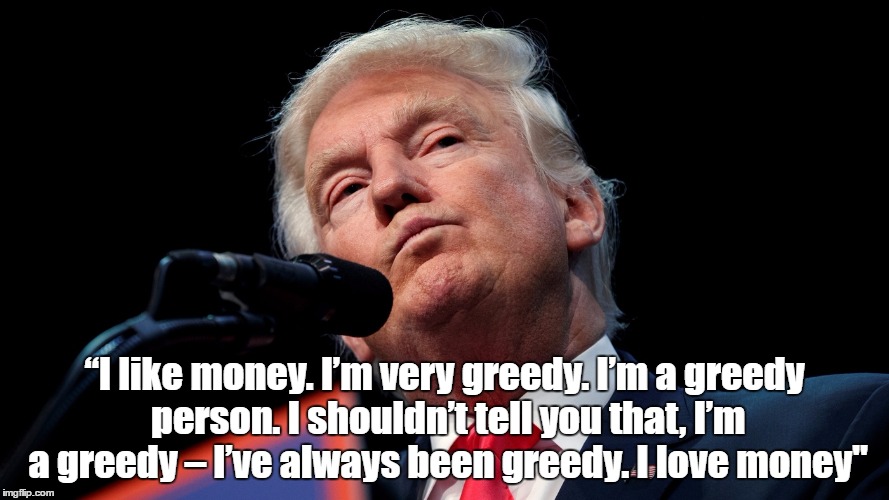St. Paul The Apostle Comments On Trump's Greed
How Capitalism Blinds You to Your Own Exploitation
How a Society Ends Up Believing the Myth That Greed is Good
https://eand.co/how-capitalism-blinds-you-to-your-own-exploitation-53e72ef5978e
Today is one of the most interesting weeks of the year — not just because America went right on collapsing, yet another mass shooting, a President banning a reporter (LOL), after a lacklustre midterm. It’s the week of National Jealousy Day, as it’s affectionately called. In Finland, every year, a list of how much everyone makes is published — and anyone can pore over it. Many do. It’s kind of a comical national event.
But it’s also something more. A slap in the face to capitalism — or perhaps a better way to put it is a clever defensive roll out from under the jackboot of capitalism, stamping on a society’s face, so it can stay something like an egalitarian social democracy. How so? Let’s think about the counterexample, which, of course, is an America that’s collapsing — but seems to want never to really change. How does a society end up believing greed is good, anyways?
Now, one of the strangest things about America, when you think about it, is that nobody really knows how much anyone else makes. The higher you rise in life, the more zealously and jealously guarded how much you make is. And then every once in a while, a number slips out — wait — that disgusting creep got $90 million after he sexually harassed women? What the? — and everyone explodes into an outraged frenzy. Consider for a moment that no one still knows how much the head of state is really worth (but her emails!!) Not very hard to see how that way lies kleptocracy — or worse.
Yet the point tends to be missed. The capitalist rule that how much one makes is private information to be jealously guarded is a kind of inviolable, sacrosanct cultural norm in America. You could even call this weird norm a kind of double greed — greed over how much one makes, and then greed about keeping it hidden. To see it in action, think about this. The first thing Americans ask each other — everyone else around the world finds it a little strange — is “what do you do?” Yet at the same time, there’s no question more shocking to an American than “so how much do you make?” Heaven forbid — what kind of barbarian would need to know that? But don’t you think the contrast is funny? Strange? I do. Let me put in an even more unforgiving way — it’s shocking to ask “how much do you make?”, but crowdfunded insulin and mass shootings? Well, those are hardly shocking anymore — just grim daily realities. Do you see my point? What is tolerated and acceptable in America is determined by capitalism, for capitalism, through capitalism — but that has had bizarre, gruesome, catastrophic results for society, about what is intolerable and unacceptable — and what is not.
Keeping information about who makes how much and for what is exactly what capitalism wants —it is a tremendously efficient, which is to say cheap, way to maximize the power of capital over labour, democracy, the planet, and humanity. Because if you don’t know how much you’re being exploited, well, what can you really do to change it? Yet in this norm, it’s self-evident that capitalism has permeated American culture so deeply and absolutely that there probably is no American aspect of culture left that isn’t just the dictates and commandments of capitalism coded into unwritten rules and unspoken codes of not just accpetable behaviour, but thought.
Now, there are two exceptions to the rule that no one knows what anyone else makes, and they both prove that rule was written by capitalism, who’s laughing all the way to the bank, because not know how much anyone else makes also makes you powerless. The first exception is in the public sector, where salaries per grade are public info, whether for teachers or accountants or policemen. The second is in unionized jobs, where again, rates are standardized, precisely thanks to unions. But in the “rest” of the economy, which is to say the capitalist part, which is more or less 75% of America…no one really knows how much anyone else makes, and it’s considered weird, rude, and strange to dare to ever really bring it up, except maybe in the most extreme cases. But that also means America tolerates a kind of powerlessness over violence, abuse, and harm that is truly unique in the world today.
What people are given in capitalist economies are abstract, impersonal “averages”, which are based on survey data — and that averaged by “jobs”, not anything else, really. Now, those averages — the “average” programmer makes so much, the “average” doctor makes so much — hide as much as they reveal. How so? To understand that, you have to understand how not knowing how much anyone else makes is also what keeps you blind to your own exploitation.
The “average” is a polite way to hide the ugly truth of exploitation. It always is. Who gets exploited by predatory systems like capitalism? Everyone. Even the one at the top of the “average” is being exploited — only less. But the deeper question is: who gets exploited most? The answer is: the most vulnerable. It doesn’t say that, for example, below the “average” usually lie women, minorities, the disabled, and anyone vulnerable — and above it, those who are shielded by virtue of their gender, race, and class. Hence, it’s easy to pretend that differences in exploitation are simply differences in competence, or differences in “fit” and “attitude” — capitalism’s favorite buzzwords for: “I’m going to use your powerlessness to exploit you as much as I can.
Let me make that clearer. There you are, a woman, disabled, a minority, and so on. You’re applying for a job, or maybe you’re in one. Nobody ever discusses how much they make. It’s a cultural norm that’s punished severely. If you were to ask, you’d be instantly painted as either crazy, difficult, weird, or, most ironically of all, greedy. So you don’t ask — and you don’t know, either.All you have are numinous, hazy “averages” to guide you. It’s time for that raise, that package, that bonus. But you don’t know how much anyone else makes. How much are you really being exploited? The answer to that question is left hanging — because that number is the precise difference between you and them. It is not the difference between you and the average — but between you and the upper standard deviations, probably. Either way, the average hides the point — which is that everybody’s being exploited, and without knowing precisely how much, you cannot really change it. How much more do you ask for? How much should you ask for? And so on. Maybe the problem is that you are just incompetent — like all the other women, the other black and brown people, the disabled ones. Maybe the problem is that the average for your group is low because they are not good at their jobs. But wait — what do you do have to do with “the average” again? Isn’t it something that restrains you — rather than frees you?
It’s in this way that capitalism blinds you to your own exploitation. Marx would have called all this false consciousness — but even he would have been grimly entertained by the spectacle of a whole country which had internalized the capitalist norm of keeping each other in the dark about how much anyone else makes, which makes everyone more powerless. There’s one way out that capitalism gives you, which Marx would have understood intimately — and that is to go from being exploited, to being a predator — one who gives, not just receives, exploitation.
It says, “well, we won’t tell you how much anyone else makes. You’ll never know how much you are exploited. If you did, after all, we’d be powerless. So we can’t tell you much about how much we abuse you. But what we will do is reward you more if you inculcate the values that we prize — greed, ruthlessness, cunning, amorality, cruelty. Show us how good you are at those things — and that is how to be rewarded more” And so out you go, maybe supposing that if you can’t beat them at their own game, you can join it. Now you are doing just what capitalism wants from you. You are learning how to exploit people just as savagely and viciously as you yourself have been exploited. Do that, and certainly, you will be rewarded. That is the escape hatch capitalism gives you.
The problem, of course, is that it leads to the abyss. For both people and for societies. Note what has really happened here. It’s not that you’ve undone any exploitation — which would mean closing the gap between what you earn, and what you (really) make. It’s that you’ve increased the sum total of exploitation — and now capitalism is giving you a slightly larger piece of the pie of exploitation which you have helped enlarge. In other words, the amount you are being exploited has only gone up — only you are receiving more for the amount you exploit others, too, now. If that’s not clear, just think of the guy who walks away with $90 mil even after abusing people — what else really explains it? Or think of endless examples of how capitalism rewards predation — from pharma companies who gouge people, to banks who blow up economies, to social networks who poison democracies and walk away smiling.
Capitalism creates something much worse than people who are grimly, grubbily exploited in this way — it creates predators: people who are quite happy exploiting others, in order to get rich themselves. Because that is really the only way out there is in capitalism. It’s not going to reward you much for doing anything of real or genuine or lasting benefit to humankind, the planet, democracy or the future, after all — but if you prey on those things better than the next person, well then, my friend, there is a fortune awaiting you.
But the rules are these. One, you must value cruelty, greed, and harm above anything else. Two, you must always put yourself first — not anyone or anything else. And three, you must never, ever tell anyone how much you are making as a result of all this — you must hide it as well and complete you can, laundering it with charity and philanthropy — because otherwise the whole system would begin to fall apart. People might question it, and wonder — “wait — why does that person, or that person, or that person, make those ungodly sums, for doing absolutely nothing that contributes a single year, element, or quality we value to our lives, but in fact cheats and starves us of them? There’s something wrong with that.” Bang! The moment people begin to question broken systems is also the moment they begin to crack and crumble from within.
And yet, as the example of America teaches us, it’s mightily difficult to get people to question systems — when those systems aren’t just thing which hold them captive, but are the very things which they hold one another captive with. When systems become unwritten rules, invisible norms, unspeakable things — then how is one to challenge anything at all? The means of your own resistance have been taken away from you. If you think your blindfold is a parachute, then you’ll probably smile winsomely as you hurtle into the abyss.
It’s not that capitalism is bad. OK, it is that capitalism is bad. Yet it’s also good, in some ways. Still, it’s necessary, and beneficial, at a small scale. But when it comes to dominate a society so much that it controls not just its economy — but its culture, its individuality, its beliefs, its social and mental structures — then all the ills that capitalism brings with it will grow: isolation, callousness, brutality, cruelty, greed, abuse. Don’t we see all that in America today — from weekly mass shootings to endless scandals? These things are hardly a coincidence, my friends — as much as Americans will fight that insight to the bitter end. But where is the bitter end? Is it here — another day, another shooting, a crazy President? Or is it somewhere even lower?
It is in institutions like National Jealousy Day that capitalism’s power is undone. Not just in sterile policies and factual debates, really. It’s true that America’s probably not ready for such institutions. Will it ever be? See the point. Capitalism’s power — let’s be precise, the power to compel us to go from being exploited to becoming predators, and trying to desperately hide that fact from our neighbours, friends, and peers — permeates society and culture so deeply that many of us are still unaware of it. That blindness is just what capitalism wants — even more than our exploitation. Then we celebrate and champion our own ruin, laughing as we plunge into the abyss. But that doesn’t lead us anywhere but, like America, down.
Umair
November 2018
November 2018
Umair: The Astonishing New Pathologies Of The World’s First Wealthy "Failed State"
https://paxonbothhouses.blogspot.com/2018/12/umair-astonishing-new-pathologies-of.html
Carnival Lust, Capitalist Greed And Counterproductive Christian Finger-Wagging

Trump's Full-Throttled Promotion Of Greed, Traditionally One Of Christianity's "7 Deadly Sins"
http://paxonbothhouses.blogspo


No comments:
Post a Comment